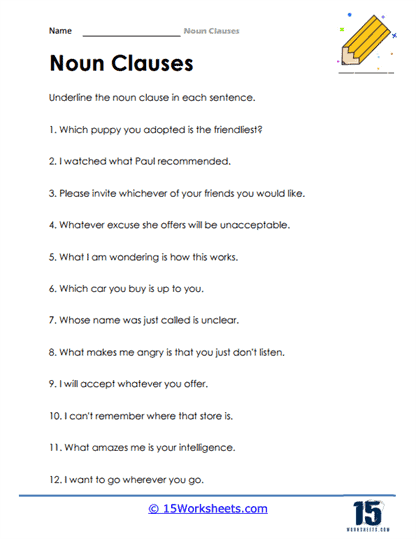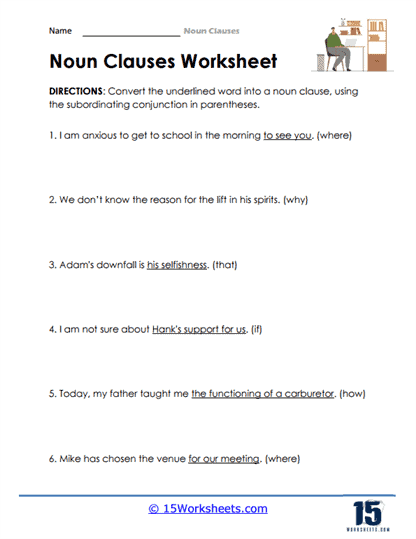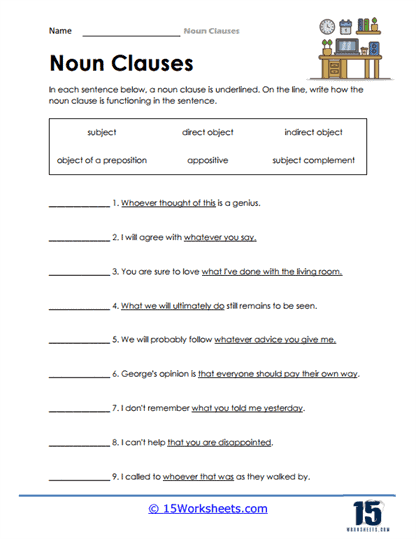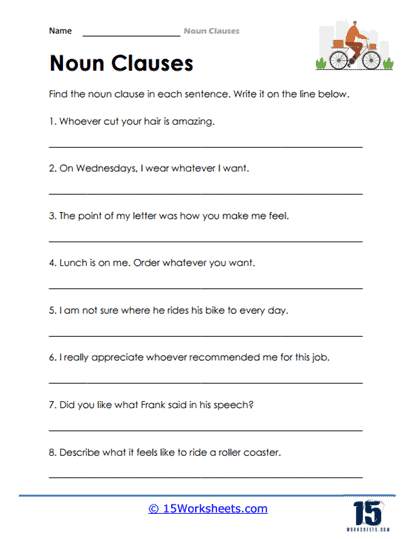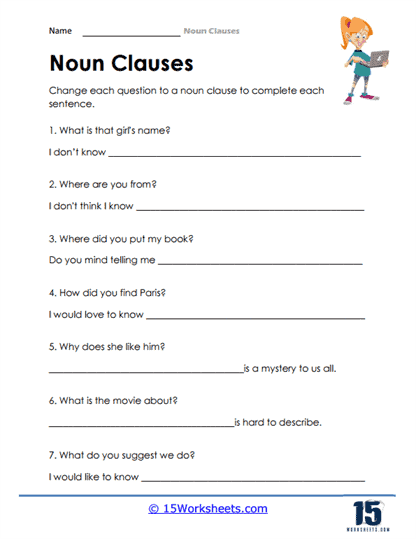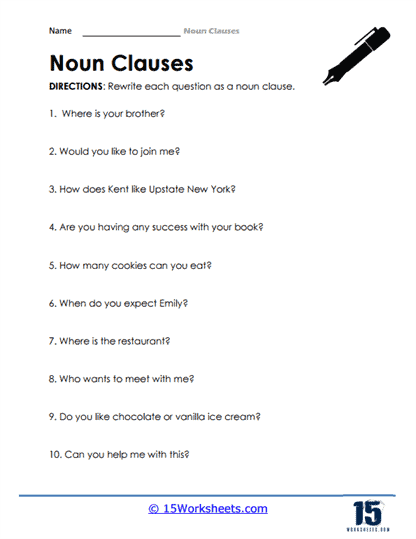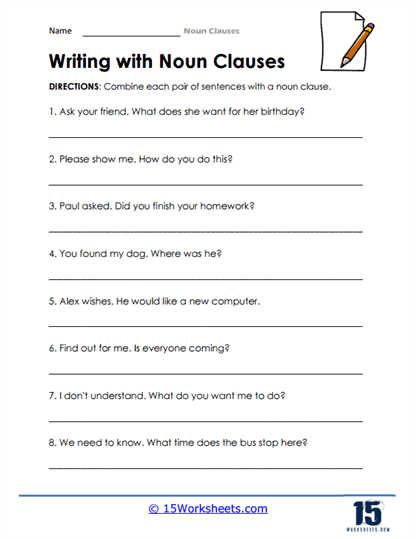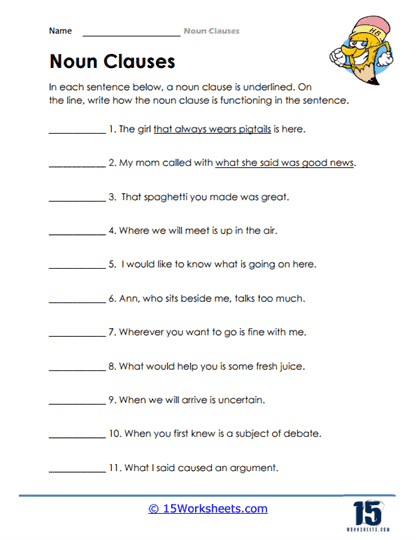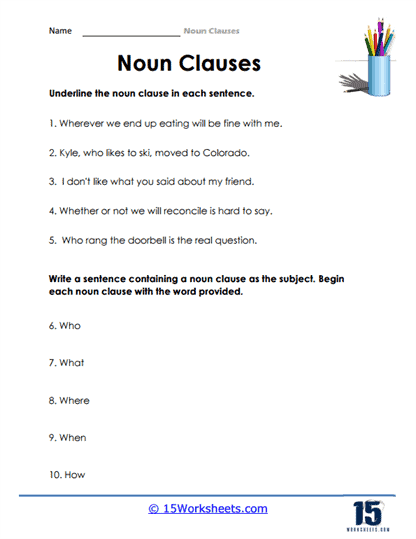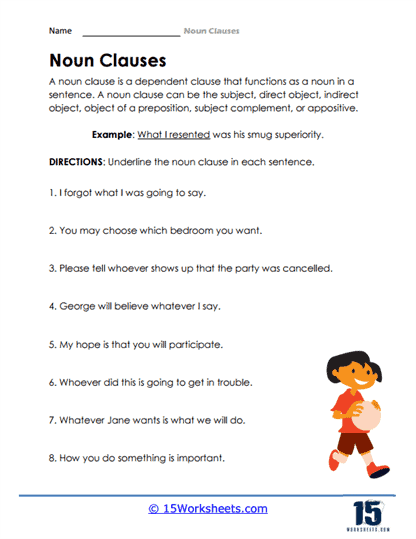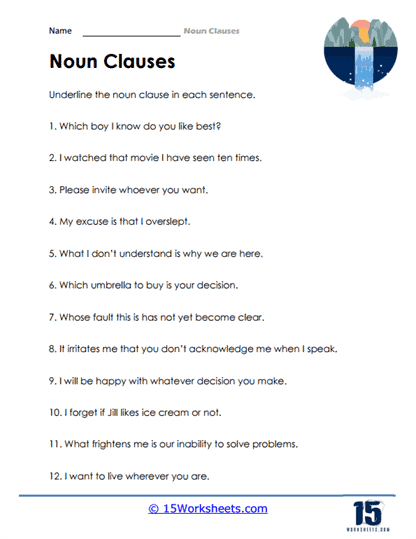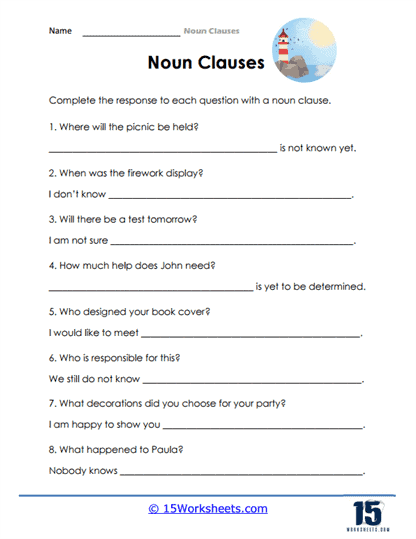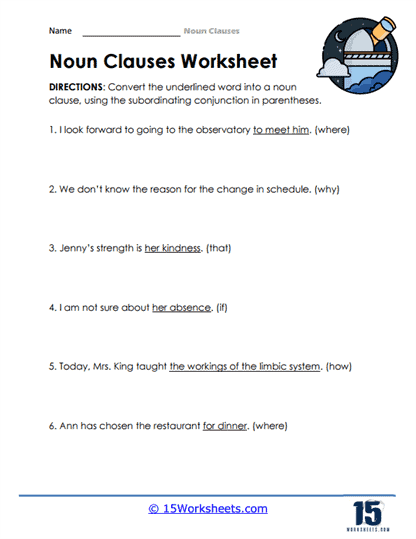Noun Clauses Worksheets
All About These 15 Worksheets
These Noun Clauses worksheets are educational materials for teachers designed to help students understand and practice the use of noun clauses in English. These worksheets include various exercises and activities, such as identifying noun clauses in sentences, completing sentences to include noun clauses, and using noun clauses in sentences correctly. Some worksheets in this collection also include a definition of noun clauses along with an example, to help introduce the topic to students.
Through these worksheets, students can improve their ability to recognize and use noun clauses correctly, which is essential for effective communication in English. Noun clauses are used in a variety of sentence structures, and they are often found in complex sentences, such as those found in literature or academic writing. By completing these worksheets, students will:
- Identify noun clauses in sentences;
- Complete responses to questions by adding noun clauses to incomplete sentences correctly;
- Convert phrases into noun clauses;
- Understand how noun clauses function in different sentences;
- And transform sentences in various ways to include noun clauses.
These worksheets provide opportunities for students to expand their vocabulary and develop their reading comprehension skills. By understanding the function and usage of noun clauses, students can identify them in written texts, understand their meaning, and apply this knowledge to their own writing.
Overall, these worksheets on Noun Clauses provide students with a comprehensive and structured approach to learning and practicing the use of this important grammatical structure. They help students to develop their grammar skills, improve their writing and reading abilities, and expand their vocabulary, all of which are crucial for effective communication in English.
How to Identify Noun Clauses?
To understand noun clauses, you first need to understand what clauses are.
Clauses in grammar are a group of words that contain a subject and a predicate. It functions as a part of one complex or compound sentence. For example, “The meeting was long, so I came home late.” This compound sentence contains two independent clauses “the meeting was long” and “I came home late.” The two sentences are joined by the conjugated conjunction “so” into a single sentence.
What Are Noun Clauses?
Noun clauses are a group of words, or clauses, that act as a noun. Noun clauses contain a subject and a verb, but together they function as a noun in a sentence.
Noun clauses are dependent clauses, which means that they cannot be written as separate sentences. They must be included in a bigger sentence to complete it. Similarly, adjective clauses function as adjectives, and adverb clauses function as adverbs in a sentence.
Take an example of the following sentences:
- She didn’t know what time it was.
- Ronan can invite all of his friends.
- He liked that she was wearing a blue dress.
Here the sentences that are written in bold are noun clauses. If you write these noun clauses independently, they will not make any sense.
- What time it was
- All of his friends
- That she was wearing a blue dress.
These sentences are dependent noun clauses and cannot function independently.
To identify a noun clause, check whether you can replace it with a pronoun. If you are successful in doing that, know that you have
found a noun clause. For example:
- She didn’t know it.
- Ronan can invite them.
- He liked it.
Other ways to identify and find a noun clause in a sentence is knowing that they often include “wh-” words like “who, when, what,
where, why,” or other question words like “how, if, that,” etc.
Types of Noun Clauses
Noun clauses can function as a subject, object, objects of prepositions, and predicate nouns.
Noun Clauses as Subject
When the noun clause performs an action, it functions as the subject of the sentence. For example:
- What Ryan did was unacceptable
- That dog Lily brought was very playful
- The dress my mother stitched was beautiful.
Here the nouns Ryan, Lily, and mother are not the subjects. Rather the noun clauses What Ryan did, that dog Lily brought, the dress my
mother stitched, act as a subject in these sentences. To further confirm this, replace these noun clauses with pronouns it.
- It was unacceptable
- It was very playful
- It was beautiful.
Noun Clauses as Object
Noun clauses can also function as the object in a sentence. These noun clauses follow the verb to tell us where the action is being done. For example:
- She checked that the recipe wasn’t correct.
- They understood why she couldn’t come to the party.
- Ben didn’t know why he got fewer marks on his exam.
To check whether these noun clauses can be identified as an object, we will break the sentences into a question and their answer.
- What did she check? That the recipe wasn’t correct.
- What did they understand? Why she couldn’t come to the party.
- What didn’t Ben know? Why he got fewer marks on his exam.
Noun Clauses as Object of a Preposition
Noun clauses can function as the objects of prepositions in a prepositional sentence. For example:
- He is not good at baking chocolate chip cookies.
- I am not responsible for the mistakes my friend is making.
- Joseph is not aware of his birthday party preparations.
Noun Clauses as Predicate Nouns
Noun clauses can also function as subject complements or predicate nouns. For example:
- Her only flaw was that she lied when she was scared
- John’s problem was that he couldn’t drive very well
- My question is whether she will make it to the concert on time.
Here the noun clauses are used to describe or modify the subject of a sentence.


